EU list of high risk third countries – May 2023
On May 17th, 2023, the European Union updated its regulation on the prevention of money laundering and terrorist financing with new rules affecting businesses in the EU. Regulation (EU) 2016/1675 supplements Directive (EU) 2015/849 (AMLD4) by identifying high-risk third countries with strategic deficiencies. The regulation has been revised to take into account the changes decided by the Financial Actions Task Force (FATF) in its last plenary in February 2023.
These countries are deemed to have strategic deficiencies in their anti-money laundering and counter-terrorist financing regimes. Banks and financial institutions, known as obliged entities, must apply enhanced due diligence measures when dealing with customers or transactions involving these countries. Our Regulatory Compliance team is ready to support businesses with the establishment of enhanced due diligence procedures or the upgrading of existing ones.
It is noteworthy that Cambodia and Morocco have been removed and Nigeria and South Africa have been added to the EU list of high-risk third countries since its last version was published in March.
The updated list of high-risk third countries is as follows:
- Afghanistan
- Barbados
- Burkina Faso
- Cayman Islands
- Democratic Republic of the Congo
- Gibraltar
- Haiti
- Jamaica
- Jordan
- Mali
- Mozambique
- Myanmar
- Nigeria
- Panama
- Philippines
- Senegal
- South Africa
- South Sudan
- Syria
- Tanzania
- Trinidad and Tobago
- Uganda
- United Arab Emirates
- Vanuatu
- Yemen
The regulation also identifies two high-risk third countries to have substantial strategic deficiencies in their AML/CFT regimes. The two countries are:
- Democratic People’s Republic of Korea (DPRK)
- Iran
Obliged entities, such as investment firms and crypto-asset service providers, operating within the EU must consider this information and adjust their anti-money laundering risk scoring and customer due diligence measures accordingly. Failure to comply with the regulation may lead to administrative or criminal offences.
The SALVUS Funds Regulatory Compliance team is available to support businesses requiring assistance with the establishment of enhanced due diligence procedures or the upgrading of existing ones.
If your business requires support with anti-money laundering regulatory requirements, please contact the SALVUS Funds Regulatory Compliance team at info@salvusfunds.com.
#StayAhead

